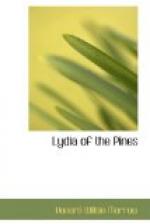Tramping through the woods with Charlie, she did not talk much, nor did he. They visited one or two neat Indian farms, but for the most part Charlie led her from one wick-i-up to the other, deep set in recesses of the wood, where the only whites to intrude on the Indians were the occasional government wood cruisers. These wick-i-ups were hovels, usually in the last stages of poverty and desolation. A squaw, braiding reed mats, a buck returning with a string of fish, a baby burrowing in the moss—all of them thin, ragged and dirty, and about them the hallowed beauty and silence of the primeval pines; this was the picture Lydia carried of most of the dwellers in these huts. Sometimes the wick-i-up was occupied by a solitary Indian, nearly always sick and always old.
Once they came upon a white haired squaw crawling feebly from her doorway toward a fish that lay at the foot of a tree. Charlie picked up the fish and he and Lydia helped the old woman back to her hut. In the hut was an iron pot and a pile of reed mats. That was all.
“She says,” explained Charlie, “that she’s been sick all winter and she’d have starved to death only one of her neighbors drops a fish for her there, every day or so.”
“Let’s get some food for her at the camp,” said Lydia eagerly.
Charlie shook his head. “What’s the use! It would just prolong her agony. She’s nearly dead now. The old can go. It’s the young ones’ starving that hurts me.”
He led Lydia out and again they tramped through the long green aisles. It was later in the day that they came upon a wick-i-up where there were three children, besides the father and mother. Two of the children were half blind with eye trouble. The whole family was sitting in the sun, about a pot of fish. The grown-ups chatted eagerly with Charlie, and he translated for Lydia.
“They say it’s been a fearful winter. They only had ten dollars this year out of their Government allowance and they couldn’t get work. They lived on fish and potatoes. The Catholic priest gave them some wild rice. The baby froze to death or starved, or both. We’ll bring some food over to these folks, Lydia, because there are kids—eh?”
“But, Charlie, what’s the Government allowance?”
“Oh, didn’t you know?—and you’re one of the white lords of creation too! The Government set aside this land for the Indians in solemn treaty with them, for ever and ever. Then it deliberately sold off a big block of it and deposited the money at Washington. The income from this was to be given to the Indians. There’s over two million dollars there. But by the time it’s filtered from Washington to the Indians, this is the result.” He nodded at the half-starved group about the fish pot. “Damn the dirty, thieving whites,” he said, quietly.
Lydia had had four days of this. As they made their way back to the camp for supper, she said to him, in an unsteady voice, “Charlie, I can’t stand it! Think of that baby that froze to death. And all these beautiful woods are full of half-starved Indians! Charlie, I can’t stand it!” And Lydia bowed her head on her arm and leaned against a tree trunk.




